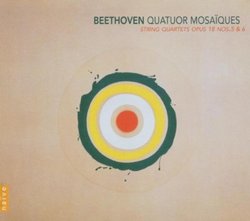| All Artists: Ludwig van Beethoven, Quatuor Mosaiques Title: Beethoven: String Quartets Opus 18 Nos. 5 & 6 Members Wishing: 1 Total Copies: 0 Label: Astree Release Date: 6/21/2005 Genre: Classical Styles: Chamber Music, Historical Periods, Classical (c.1770-1830) Number of Discs: 1 SwapaCD Credits: 1 UPC: 822186089019 |
Search - Ludwig van Beethoven, Quatuor Mosaiques :: Beethoven: String Quartets Opus 18 Nos. 5 & 6
 | Ludwig van Beethoven, Quatuor Mosaiques Beethoven: String Quartets Opus 18 Nos. 5 & 6 Genre: Classical |
Larger Image |
CD Details |
CD ReviewsMore Exceptional Early Beethoven by the Quatuor Mosa´ques J Scott Morrison | Middlebury VT, USA | 06/29/2005 (5 out of 5 stars) "Many lovers of Beethoven's string quartets tend to focus on the mature middle-period quartets and the ground-breaking late quartets, ignoring to some extent the six quartets the composer wrote before 1800, his Op. 18 set. Some feel that they are simply extensions of Haydn's or Mozart's art and not worthy of as much attention as the later more 'Beethovenian' works. To some extent, one supposes, this is true, but these six quartets repay close scrutiny in their own right. Quatuor Mosaïques, an original instrument quartet using gut-strung instruments actually made in the 17th and 18th centuries, has recently made an addition (Quartets 1 & 4) to their traversal of the set begun in the early 1990s. The present disc containing Quartets Nos. 5 & 6 were originally recorded in 1994 and issued on the Astrée label. They are now released as a companion to the new recording, which I recently reviewed here. There is no explanation for the ten year gap between the present recording and that of Nos 1 & 4 which were recorded in 2004. And there is no word about when, or if, they will be recording Quartets No. 2 & 3. One hopes they will do so, though, because the two discs already issued are very worthy additions to the huge Beethoven quartet discography. In my review of Quartets 1 & 4 I suggested that that recording is a must-have for musiclovers who already have multiple recordings of those quartets, largely because of their 'new' take on the works. The same holds true for this CD as well. Quatuor Mosaïques is, simply put, the best original instrument quartet currently playing. The sounds they make are indescribably gorgeous. They use a modicum of vibrato, but much less than is typical for modern-instrument groups. The sound produced by gut strings paradoxically gives these quartets a more 'modern' (or perhaps I mean 'Romantic') sound than those on modern metal strings. The sweetness and depth of their sound must be experienced to be understood. As for Quartets Nos. 5 and 6, they are extremely well-known works and I won't go into much description of the music itself. For me there are some passages that never fail to engage me. In Quartet No. 5 alone: the accents on the third beat that recur incessantly in the trio of the Menuetto; the unexpected chromaticism of the quartet, particularly in a couple of the variations in Mvt. III; the chordal second theme of the Allegro finale, the formal reminiscences of Mozart's A major quartet, K. 464. There is plenty to delight here. The same is true of the final quartet of the set. I am always affected by the contrast between the almost trivial-sounding madcap Mvt. III followed by the last movement, subtitled 'La malinconia.' Beethoven marked the Adagio introduction to the movement 'Questo pezzo si deve trattare colla più gran delicatezza' ['This piece must be played with greatest delicacy'], which Quatuor Mosaïques does movingly. Their subtlety here reminds me of the sound of the great Busch Quartet Beethoven quartet recordings from the 1930s. This disc is a must-have for those who already think they know the Op. 18 quartets. And a first-time buyer of these quartets would not go wrong here, either. Scott Morrison" The old is new again Michael | Wisconsin, USA | 10/17/2009 (5 out of 5 stars) "I wouldn't have known that this is a "gut string" performance had I not been told. In another direction I should note that what astounds me even further is how much these performances of the early quartets sound like those of perhaps my favorite performances of the whole Beethoven set: the 1950's recording by the Pascal Quartet. It was issued in the U.S. at least on one of those subscription labels (Concert Hall) so popular in the early days of LP. I've traced down a complete set and am in the process of transferring them all into digital and editing out the ample surface noise. What strikes me about the Mosaiaques performances of Op. 18 is that they like the Pascal emphasize the emotional content over the "classical." Is there a "French connection" here? The Pascal may even go farther: there are brief passages in the earlier performances that actually sound atonal. Where the Pascal tends to the "heroique" the Mosaiques are perhaps more introspective. In any case. I'm thrilled to have the later set available as well."
|
